Business
NNPC petrol price without subsidy is N400/litre – Marketers

The lowest price the Nigerian National Petroleum Company Limited can sell Premium Motor Spirit, popularly called petrol, to marketers, assuming there is no subsidy, is N400/litre, it has been learnt.
Oil marketers, who made the disclosure on Sunday, also gave other reasons for the continued scarcity of petrol, which had led to the lingering queues at filling stations nationwide.
They said PMS imports charges were becoming unbearable for the sole importer of the commodity – the Nigerian National Petroleum Company Limited, disclosing that the NNPC had been subtly pushing these charges to depot owners.
It was learnt that depot owners, on their part, were also passing the charges to filling stations, which in turn push it to final consumers of the product, a development that has led to the increase in the pump price of the commodity.
It was also gathered that the Federal Government had quietly allowed depot owners to raise the ex-depot price of petrol to about N185/litre, whereas the approved rate used to be N147/litre.
This came as the scarcity for petrol continued on Sunday. Many retail stations in Abuja were shut due to lack of products to sell. Residents had to resort to black marketers, who sold their products in jerry-cans.
READ ALSO:
- Adeleke freezes government accounts, reverses state name
- Breaking! Adeleke Makes First Appointments As Governor of Osun
- Ebonyi INEC office set on fire, PVCs, ballot boxes burnt
The same scenario played out in parts of Nasarawa and Niger states, as oil marketers explained that the rise in the dollar was also contributory to the PMS scarcity witnessed in Nigeria.
“The dollar is affecting PMS purchase, something you were buying for about $15/tonne when the dollar was about N440 to N450, but currently the dollar is about N750 to N800. Definitely the price of the product will increase,” a major marketer, who pleaded not to be named due to lack of authorisation, stated.
The official added, “You can buy a product, say $10/tonne from maybe Russia, it will get to Nigerian waters at that rate, but most of those mother vessels, as soon as they discharge into your own vessel, whatever rate you now pay will be international rates in dollar.
“The mother vessel has its limit, it has to be stationed at Atlas Cove. But the daughter vessel you are going to charge, which brings in the product, will be charged in dollars. They don’t take naira. So all these charges come in dollars.”
The source stated that these charges were currently hitting hard on the NNPC, as the oil company was finding it tough to bear the increased fuel imports’ rates.
“All vessels operate on international rates and it must be in forex. So as it is now, the rates are getting so high for NNPC to bear alone. Some of these charges have to be pushed to depots that are taking the products and they have to pass it on to consumers,” the oil marketer stated.
The source added, “The subsidised ex-depot rate for petrol from NNPC is about N147/litre, but tell me, which depot is selling at that rate today? I know somebody who said he bought from a depot at N182/litre. And he got it at this rate because he did bulk purchase, he bought about 20 trucks.
“And he bought it from one of the major marketing companies. So when you make a bulk purchase at N182/litre, then you can imagine what those who are buying one or two trucks will have to pay for the product.
“This means that there is hardly any depot you can go to now that you can get products for less than N185/litre. And by the time you buy at N185/litre at the depots, why won’t they sell at N200/litre and above?”
This development was confirmed by the National Public Relations Officer of the Independent Petroleum Marketers Association of Nigeria, Chief Ukadike Chinedu, who stated that NNPC was currently finding it tough to continue subsidising PMS.
READ ALSO:
- I reduced debt, left N14bn behind – Oyetola
- How Osun AG avoided gov Oyetola over payment of salaries till last day in office
- Lagos- Ibadan expressway will not become another Abuja-Kaduna Expressway – Gani Adams
“The least that NNPC can sell petrol is over N400/litre to depots and not at N145/litre, but because of subsidy, which is becoming over-bearing on them, the oil firm has been struggling to subsidise,” he stated.
He added, “That is why you see the lapses. The government is looking for dollars to import this product and pay the contractors importing for NNPC, and it is also trying to subsidise PMS.”
Ukadike explained that the landing cost of PMS in Nigeria was about N450/litre, as he noted that subsidy on PMS was no longer sustainable.
“The government will not continue to be Father Christmas and cripple the economy. Subsidy must stop!” he stated.
Agencies keep mum
The Group General Manager, Group Public Affairs Division, NNPC, Garba-Deen Mohammad, did not respond to enquiries when contacted. In fact, the NNPC has remained mute on issues around fuel scarcity.
Similarly, the Nigerian Midstream and Downstream Petroleum Regulatory Authority, the regulator of the downstream oil sector, stayed mute when contacted.
The NMDPRA, just like NNPC, has also remained mute on this matter since last week. The agencies of the Federal Government have decided not to speak on the cost of PMS, amidst the scarcity of the product and attendant queues.
The President, Petroleum Retail Outlet Owners Association of Nigeria, Billy Gillis-Harry, told our correspondent that the crisis in the downstream oil sector would continue until the industry was deregulated.
READ ALSO:
- Lagos- Ibadan expressway will not become another Abuja-Kaduna Expressway – Gani Adams
- Adeleke freezes government accounts, reverses state name
- 2023: Peter Obi Will Fade Away Soon – Omokri
“We have said it times without number that this issue will continue to drag as long as there is subsidy on petrol, which from all indications is no more sustainable. So the best thing is to stop it,” he stated.
Meanwhile, Ukadike also stressed that the continued payment of subsidy on petrol was taking a toll on not just the resources of NNPC but also on the Federal Government.
He said, “It is becoming increasingly difficult for them (NNPC). In fact, it is taking a toll on the economy generally. And even the Federal Government cannot contain it.
“So the best way out is just to allow people to be able to adapt to the non-subsidy regime in order to relax the pressure on the dollar and the government can then invest in other sectors.
“All these issues, including the subsidy regime, contribute to the scarcity we see across the country. The naira is crashing against the dollar, there is less supply of products, NNPC and the government are battling to subsidise petrol, why won’t there be scarcity?”
Subsidy gulps N6.88tn
Last month, The PUNCH exclusively reported that the administration of Nigeria’s President, Major General Muhammadu Buhari (retd.), could spend not less than N10.976tn as subsidy petrol from when it came to power in 2015 till May 2023.
The report showed that already, the government had spent about N6.88tn in subsidising the commodity, according to data obtained from NNPC and the Nigeria Extractive Industries Transparency Initiative.
The President and his party, the All Progressives Congress had, however, kicked against the fuel subsidy scheme that was implemented by the previous administration of the Peoples Democratic Party, while campaigning in 2015.
NEITI had stated in a report submitted in September to the House of Representatives ad-hoc committee investigating the fuel subsidy regime from 2013 to 2022, that petrol was subsidised all through these years.
In October, the Minister of Finance, Budget and National Planning, Zainab Ahmed, told members of the House of Representatives that the Federal Government’s projection was to spend N6.72tn on subsidy in 2023.
She, however, said the second option of the government was to keep fuel subsidy till June 2023 and that in this option, fuel subsidy was projected to gulp N3.3tn.
A combination of all the above figures indicated that the Buhari regime could spend nothing less than N10.976tn on petrol subsidy from 2015 and June 2023.
IPMAN laments scarcity
Meanwhile, the National Controller, Operations, IPMAN, Mike Osatuyi, told The PUNCH on Sunday that its members still lacked the product, adding that few filling stations which had PMS were selling between N230 and N240 per litre.
“We don’t have products because we could not get to buy. There are currently no products at depots”, he said.
According to him, IPMAN currently has over 30, 000 members nationwide, and accounts for 70 per cent ownership of retail outlets in Nigeria.
“Our members are in the villages and outskirts. Go everywhere, you will see our stations”, Osatuyi added.
A Depots Association of Petroleum Products Marketers Association of Nigeria source who pleaded anonymity said its members had paid for products but were not getting any from NNPCL.
“We have people who have paid but were not given. But the NNPC would say it has stock. Where is the stock and why don’t we have products in our tanks?”
The Chairman, IPMAN, Lagos Satellite Depot, Ejigbo, Akin Akinrinade, had said members of the association ought to be getting supply from the Pipelines and Product Marketing Company.
He said members had made payments in excess of N1bn since October 2021.
He however said the products were yet to be delivered, forcing members to patronise private depots for products while at the same time, servicing loans borrowed from banks for their money with PPMC.
PUNCH
Aviation
Aviation workers threaten nationwide airports shutdown over Customs officer assault

Aviation workers threaten nationwide airports shutdown over Customs officer assault
Aviation unions have announced plans to shut down airports across Nigeria starting March 31 in protest against the failure to remove a customs officer who allegedly assaulted the Director of Aviation Security at the Federal Airports Authority of Nigeria (FAAN).
In a joint statement signed by Ocheme Aba (NUATE), Frances Akinjole (ATSSSAN), and Abdul Rasaq Saidu (ANAP), the unions condemned the repeated physical assaults on FAAN staff, vowing not to tolerate such incidents any longer.
The unions also called on the government to urgently reduce the number of customs officers operating within the aviation sector, aligning with global best practices. They warned that if their demands are not met, they will proceed with the nationwide shutdown, potentially disrupting air travel and operations.
The statement reads: “Considering the enormity and frequency of physical and psychological assault on the staff and management personnel of FAAN, of which there is no end in sight, we are compelled to inform the management of the unwavering determination of our unions to cause the establishment of a clear framework of mutual respect among FAAN staff and the security agencies operating at the airports.
READ ALSO:
- Over 100 suspects arrested in Abuja Ponzi Scheme Academy raid
- Again Obasanjo accuses federal lawmakers of bribery
- FG to pay corps members backlog of delayed N77,000 allowance
“Consequential sanctions are in place which guarantee the safety and human rights of FAAN staff. We shall direct all the workers to withdraw from the airports with effect from March 31, 2025, pending when such protocols are established.
“The recent assault on no less a personality than the Director of Aviation Security of FAAN is one too many, which leaves a taste too bitter to swallow. It is our sincere hope that our demand in the above respect is well met to avoid the industrial conflagration that will ensue in the absence of acceptable remedial actions.”
In response, Abdullahi Maiwada, the spokesperson for Customs, stated in a recent release that the disagreement between FAAN officials and officers of the Nigeria Customs Service (NCS) stemmed from a miscommunication over equipment movement and seating arrangements.
Aviation workers threaten nationwide airports shutdown over Customs officer assault
Business
SEC announces stricter measures to protect investors
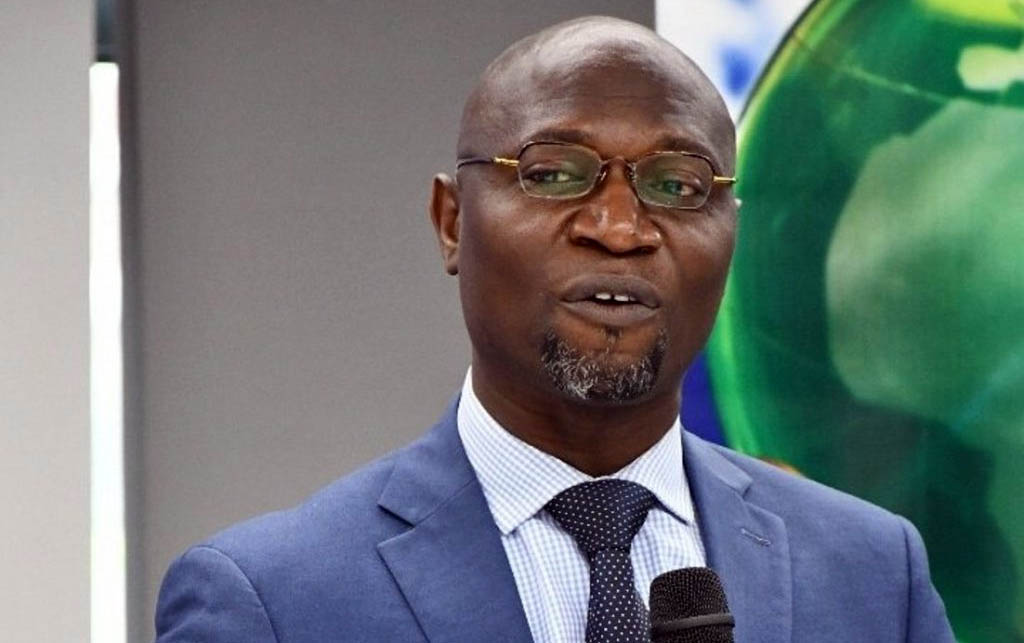
SEC announces stricter measures to protect investors
The Securities and Exchange Commission (SEC) has reaffirmed its commitment to protecting investors in Nigeria’s capital market by cracking down on fraudulent activities.
According to the Director-General of SEC, Dr. Emomotimi Agama, operators engaging in unscrupulous practices will face strict penalties as the Commission prioritizes safeguarding investor interests.
“So, clearly for us, it is getting people to understand that there is no hiding place anymore for anybody that has the intention to defraud Nigerians and to defraud anybody that is investing in this market,” Dr. Agama stated, emphasizing the Commission’s zero-tolerance policy.
READ ALSO:
- Why postgraduate students are ineligible for FG loan – NELFUND
- Bitcoin rises above $86,000 as crypto market gains momentum
- 2 Nigerians in US face heavy jail term over fraud
Dr. Agama highlighted that the Investments and Securities Act (ISA) 2007 serves as the framework for securities regulation in Nigeria, ensuring that market operators adhere to high ethical standards.
He emphasized the importance of the “fit and proper person’s test,” which requires operators to meet specific regulatory criteria to maintain their licenses.
“This is because the very ethics of regulating or registering a securities market operator is in the principle of the fit and proper person’s test,” he explained.
“What you have been seeing most recently by the revocation of licenses, the suspension of operators and our follow-up to operators that are not registered with the SEC is only a tip of the iceberg as to what we intend to do this year.”
Dr. Agama assured stakeholders that the SEC will leverage its regulatory powers under Nigerian law to deter fraudulent activities, noting, “We believe strongly that a protected investor is a powerful investor.”
SEC announces stricter measures to protect investors
Business
Bitcoin rises above $86,000 as crypto market gains momentum

Bitcoin rises above $86,000 as crypto market gains momentum
Bitcoin and other leading cryptocurrencies extended their gains on Monday, buoyed by positive investor sentiment despite concerns over upcoming U.S. tariffs and key economic data releases later this week.
As of 7am WAT, Bitcoin rose 3.2% to $86,590, while Ethereum gained 2.3%, trading at $2,047.
The global cryptocurrency market capitalization increased by 2.94% in the past 24 hours, reaching $2.84 trillion.
Other notable performers included XRP, Cardano, and Dogecoin, which posted gains of 3%, 2%, and 3.8%, respectively. Chainlink, Avalanche, Hedera, and Stellar recorded growth ranging from 3% to 10%.
“Bitcoin is holding above $86,000, registering a 3% gain today. The key resistance level to watch is $86,700; a breakout could pave the way for $90,000,” said Vikram Subburaj, CEO of Giottus.
Bitcoin’s market capitalization surged to $1.727 trillion, with dominance rising to 60.73%. Its 24-hour trading volume soared by 93% to $18.2 billion, while stablecoin transactions accounted for 94.74% of total crypto trading, reaching $57.58 billion, according to CoinMarketCap.
READ ALSO:
- 2 Nigerians in US face heavy jail term over fraud
- Canada denies 13,000 Nigerians refugee status
- Lagos Govt to redesign Oshodi motor park for rail integration
Solana Outperforms Peers Amid Positive Market Sentiment
Solana (SOL) emerged as a standout performer, surging over 7% in the past 24 hours to trade above $139.
The rally was fueled by reports suggesting that President Trump’s April 2 tariffs may be more targeted than initially feared, easing market concerns.
Weekend rumors indicated that the tariffs might include country exemptions and non-cumulative charges on metals, contributing to improved sentiment across global markets.
The Federal Reserve’s projections for two rate cuts this year further supported risk assets, with the central bank describing potential tariff-induced inflation as “transitory.”
BitMEX co-founder Arthur Hayes expressed optimism about Bitcoin’s trajectory, stating, “The Fed’s policy orientation could help Bitcoin achieve $110k before it retests $76.5k.”
Solana’s momentum aligns with unprecedented acceptance rates. DeFiLlama reported that Solana’s total value locked (TVL) reached 54.87 million SOL, its highest level since June 2022. Ali Charts revealed that a record 11.09 million addresses now hold SOL, underscoring growing adoption.
Bitcoin rises above $86,000 as crypto market gains momentum
-
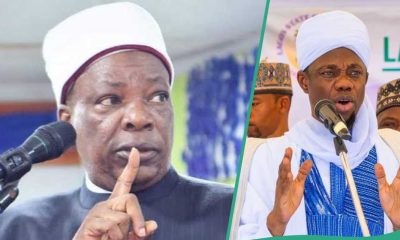
 metro1 day ago
metro1 day agoAttack on Mufty of Ilorin: Onikijipa Family Charges Stakeholders to Call Sheikh Habibullahi Al-Ilory to Order
-

 metro3 days ago
metro3 days agoCourt refers Ojukwu property case to alternative dispute resolution
-
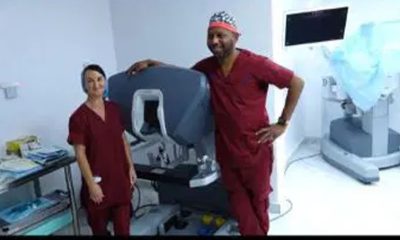
 Health2 days ago
Health2 days agoNigerian doctor pioneers W’Africa first robotic prostate cancer surgery
-

 metro3 days ago
metro3 days agoCBN rejects Osun nomination of ex-Aregbesola’s commissioner as bank director
-
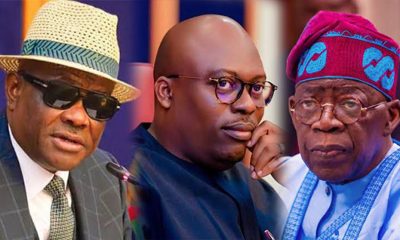
 metro3 days ago
metro3 days agoRivers: Presidency reveals security intelligence leading to emergency rule
-
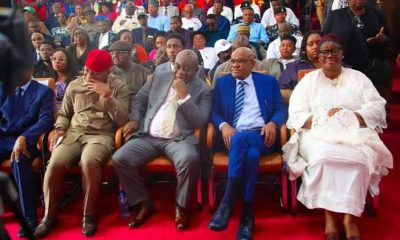
 metro2 days ago
metro2 days agoFubara: Supreme Court reacts to photo of Justice Agim with Wike
-
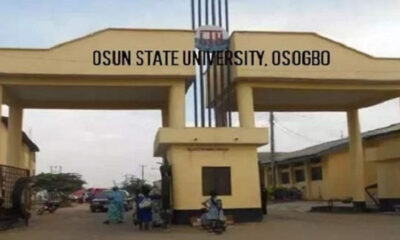
 metro2 days ago
metro2 days agoUNIOSUN mourns as 5 students die in auto crash
-
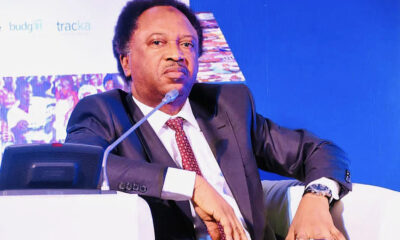
 metro3 days ago
metro3 days agoShehu Sani faults senators taking voice vote objection to media









